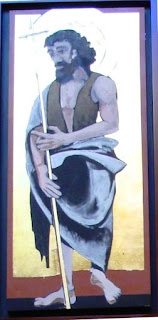Homily
for the
2d
Sunday of Advent
Dec. 10, 2023
Mark
1: 1-8
Is
40: 1-5, 9-11
The Fountains, Tuckahoe, N.Y.
St. Francis Xavier, Bronx
Assumption, Bronx
“The beginning of the gospel of Jesus Christ the Son of God” (Mark 1: 1).
Last
Sunday we began a new church year. This
year we’ll read mostly from St. Mark’s Gospel.
Last Sunday we were still immersed in considering the Last Days: the end of history and the final judgment of
human beings. So we read a gospel
passage from Jesus’ warning always to be on the watch for our Master’s return. That’s a main theme of this season of Advent,
as the Catechism of the Catholic Church reminds us: “When the Church celebrates the liturgy of Advent each year,
she makes present this ancient expectancy of the Messiah, for by sharing in the
long preparation for the Savior’s first coming, the faithful renew their ardent
desire for his second coming” (No. 524).
The 2d
reading today includes more than a hint of being ready for the end of all
things. St. Peter advises us that “the
heavens will pass away with a mighty roar,” adding some details (2 Pet
3:10)—which, I’ve heard, astrophysicists tell us could be how Earth’s days may
end many centuries from now (no need to worry), if we don’t blow ourselves up
first (worry!). So Peter tells us to
conduct ourselves “in holiness and devotion” as we wait for Christ’s return
(3:11-12).
But our
1st and 3d readings turn us toward Christ’s 1st coming, our other Advent
theme. And we read the opening 8 verses
of Mark’s Gospel. After announcing his
lofty subject—this is the Good News of Jesus Christ, which may be read in 2
ways: the Good News about Jesus
Christ, or the Good News that Jesus Christ has brought us—Mark further
identifies who this Jesus Christ is: the
Son of God. Practically speaking, his
Gospel will culminate with the same statement:
“When the centurion … saw how he breathed his last, he said, ‘Truly this
man was the Son of God!’” (15:39).
Given
that profession of purpose and of faith, we may find it strange that Mark
doesn’t give us an account of Jesus’ origins, as do Matthew and Luke—neither a
birth story nor a genealogy. Instead, he
begins where the preaching of the apostles began, as we read in the Acts of the
Apostles—with John the Baptist. For Mark
and for the 1st Christian generation, how and where Jesus was born was a
non-question. Well, that would put a
damper on Christmas, wouldn’t it! What
Mark and the first preaching considered important was John’s proclamation that
the Mighty One of God was at hand, the one who would baptize people with the
Holy Spirit (1:8). The way to prepare
for the coming of the Mighty One was by repenting of one’s sins, straightening
out one’s life.
Mark takes pains to show how John the Baptist’s appearance and preaching harmonizes with the prophecies of Isaiah. More than 5 centuries before Christ, a prophet endowed with the spirit of Isaiah had prophesied a new exodus, a new liberation, of Israel: they would be set free from their exile in Babylon, would cross rugged land—a barren desert, lofty mountains and hills—to return to their homeland in Judea; God spoke thus tenderly to Jerusalem, proclaiming that Judah’s guilt was expiated. And the people would see “the glory of the Lord revealed” (Is 40:2,4-5).
But John
comes to announce a different kind of exodus, a different kind of liberation, a
different kind of expiation for sins. He
appears in the desert not to announce that Israel should pack their bags and
get ready to move, but that they should “prepare the way of the Lord,” make a
way for him into their souls by acknowledging their sins and looking for the
one who would “baptize with the Holy Spirit,” unite them not to their homeland
but to their God.
For God
in Christ comes to “feed his flock, to gather the lambs and carry them in his
bosom, to lead the ewes with care” (Is 40:11).
He comes with the Good News that we are set free from our sins, cleansed
by the Holy Spirit, as soon as we bring those sins to this Mighty One of God,
to Jesus Christ our Lord.
During
this Advent season, then, we pray that by straightening our ways (cf. Mark
1:3), reforming our lives, we may “haste to meet [God’s] Son,” who will admit
us “to his company” (Collect), to the company of the Holy Trinity, of the
Virgin Mother, and of all God’s holy ones.


No comments:
Post a Comment